Portland beckoned. It was a jewel, this city, the sun glinting off the Willamette by day, the river sparkling from city lights by night. There’s an ethos of craft and of care, of good intentions and good company. If there is an artisanal food or beverage to be made, you can be sure that it is being made in Portland, and made well.
My family and I moved to the Rose City, as newly former professors, in the Fall of 2018. For a while, we were thrilled. Just as during our many visits in the earlier years of the new millennium, we found a lifestyle and climate that encourages people to be outside, quirky and independent retail districts, and food and art scenes that were divine.
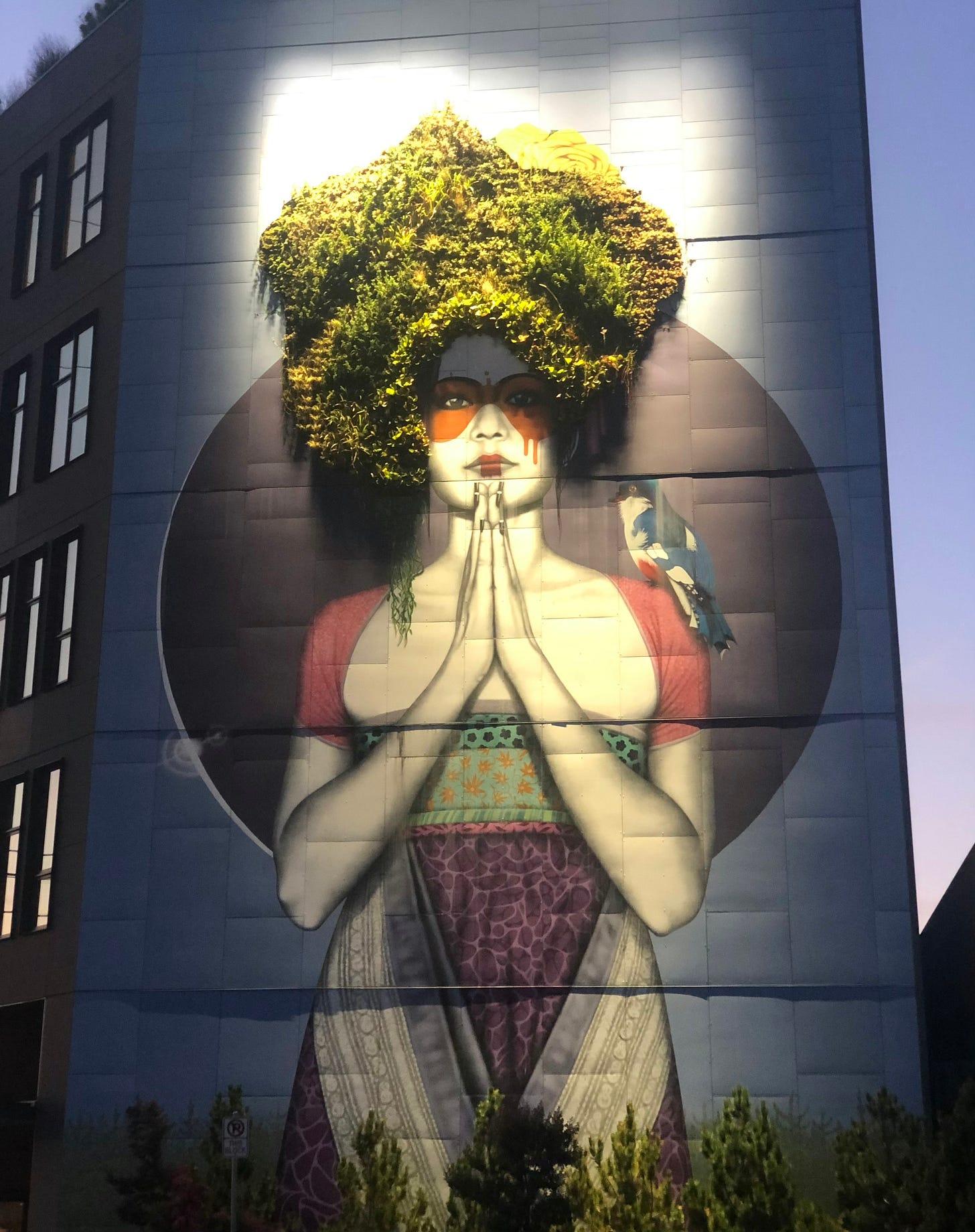
Not that there weren’t intimations of another side of Portland. There was the burrito food cart run by white women, which was driven out of business by activists who were outraged that the owners weren’t Mexican enough to be selling burritos.
There were multiple attacks on Andy Ngo by hooligans, some of whom called themselves antifa. His sin was shining a light—and pointing a camera—at their anti-social and criminal antics. One of those attacks left Andy hospitalized with a brain bleed1.
And there was the attempted cancellation of Nancy Rommelmann and her husband Din Johnson. He ran a successful coffee roastery and handful of cafes; she writes books and engages in cultural commentary. Her sin, in late 2018, was that she had begun a YouTube series with a friend called #MeNeither, as the #MeToo movement was pulsing along; his sin, apparently, was being married to her. An angry employee of Din’s made it her mission to destroy his business and their lives, and managed to expedite the former, but not the latter.
Nancy and Din are no longer in Portland, and neither is Andy. I don’t know about the women with the burrito cart. That’s too bad for Portland, but wholly understandable. They were done.
This was before Covid hit. Before businesses were closed by law—shuttered for safety. Before George Floyd died. Before over a hundred consecutive days of protests reliably turned into a hundred consecutive nights of riots. Before the businesses that were finally allowed to reopen were targeted, over and over and over again, by lazy thugs who had the city’s leadership in their thrall. Before dumpster fires moved from snarky metaphor to regular reality.
All cops are bastards, we are assured, and you’d best nod along. In October of this year, the Native American owner of a café in northeast Portland agreed to host “coffee with a cop,” which was to be an opportunity for community members to ask questions of their local police. Within hours of her announcing the event, though, her shop was vandalized: thousands of dollars of damage done, native art and artifacts destroyed.
But it’s not the people terrorizing the city’s citizens who are in the wrong. Oh no. The vandals and assailants are standing up against all of the -isms, including especially fascism. They are the anti-fascists, the anti-racists, the anti-badthings. Object to them or what they do, and you are the enemy. Object to them, and you are the fascist. You are the racist. You are the very baddest of things.
Objecting to graffiti is racist. Objecting to nightly trashings of the city is fascist. Calling the cops is racist. Protecting yourself is fascist. Standing up to violence is—wait for it—violence. So say the anti-fascists. Why do we believe the labels that people give to themselves? The anti-fascists and their ilk are wearing the very finest golden threads that money can buy! Look at them though. You don’t even have to look closely. They are wearing nothing at all.
Virtue & Vice
Bad policy has left a downtown, once vibrant and fun, so devastated that most locals don’t go at all anymore. At the end of the Summer of 2020, rioters set fire to the building in the Pearl district where mayor Ted Wheeler lived. They wanted him to resign; instead he apologized, and moved out. He is still the mayor of Portland. Also in 2020, federal dollars sent under the auspices of the CARES Act Coronavirus Relief Fund, which existed to help small businesses during governmentally imposed lockdowns, were largely diverted instead to “provide economic relief to the black community,” with the claim that, “the Black community is at the front of two pandemics: COVID-19 and systemic racism.” And thus, Portland continued to sink under its own, virtuous weight.
As Covid thrummed along, the schools prioritized the concerns of fringe activists over the children they were supposed to be educating. Portland kept its children out of school for a very long time. After nearly a year of remote schooling, with many more months to come, instead of fighting to get children back in classrooms or, barring that, working to ensure that all students actually had access to computers and the internet, some schools focused on changing the names of schools. Johnny can’t read, and Marta is at home with no food or heat, but high schools named for U.S. Presidents (who are self-evidently racist) have at last been freed from that repressive history. Glory be.
And Covid fear and illogic has resulted in a large number of people being masked even now, even outside. Signs on businesses requiring masks and proof of vaccine for entry were common through much of 2021 and 2022. Those who don’t cater to the CDC’s narrative are heaped with scorn, and worse, by their friends and family.
But for all that, if you know where to go—and where not to go—Portland still is a beautiful city. It is lush, the parks are gorgeous, and the food exquisite. On two days last week, I returned to the city that I had called home for four years, before moving away two months ago. I returned to Fall weather that was breathtaking in its beauty—the warmth of Summer had lasted so long that the trees were still aflame with red and orange and yellow leaves, even as nighttime temperatures dipped into the 30s and daytime highs were only in the mid-40s.
There was an eerie pall over everything, though2. Before the polls closed on election day, I walked around the Pearl District, and saw almost no people. The day was cold but not bitter, the sky an achingly clear blue. There should have been people everywhere, out enjoying the day, their beautiful city, their lives. Instead it felt like a ghost town, a city whose time has passed.
The next day, however, after an election night during which nothing new was burned down or destroyed (so far as I can tell), there were once again people on the streets. Had the citizens of Portland been hiding from the lazy thugs who now pass for political activists, in fear that they would wreak havoc on election night? Probably so. Two years ago, in 2020, when Biden was elected, antifa went on a terror spree in Portland. They admitted then, “we are ungovernable.” Why anyone, elected or not, thinks that letting these goons have their way is an appropriate or kind response is beyond me.
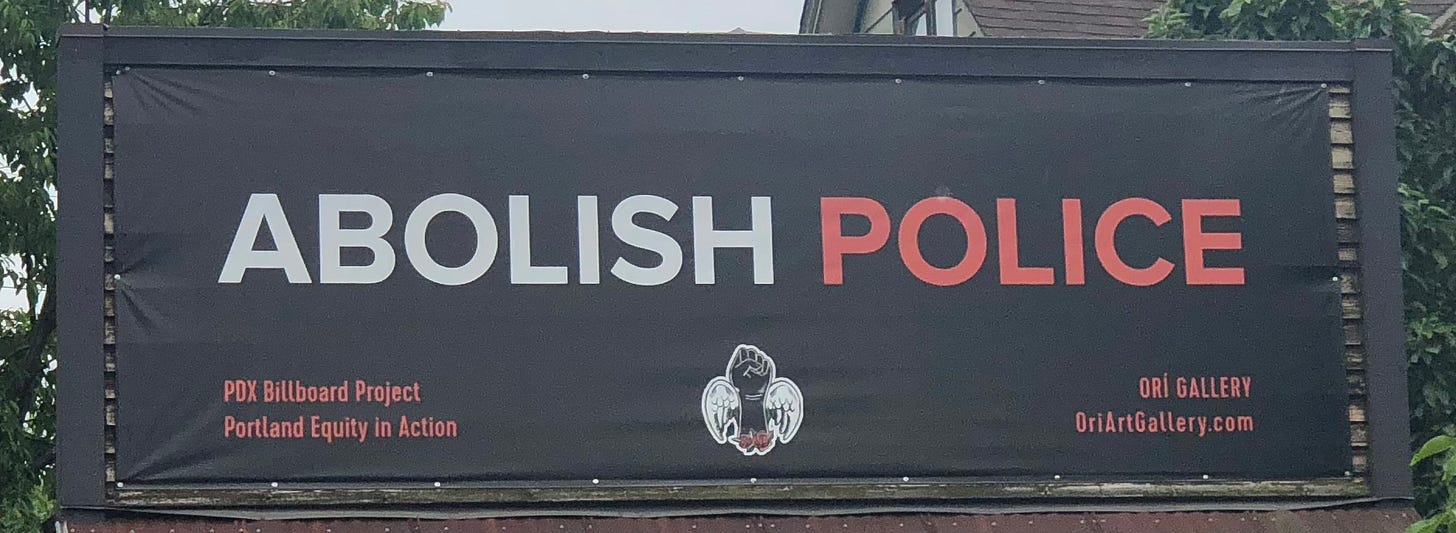
Finally this is dawning on more and more people. Even Willamette Week, Portland’s free newsweekly, has seen the errors of its ways, at least a little bit. Willamette Week has been wrong on too many topics to count (and personally nasty to me and mine). Following in that tradition, in May of this year, they endorsed Jo Ann Hardesty in the primaries, after she had spent nearly four years on the City Council working very hard and rather successfully to destroy Portland. Before the general election in November, however, they changed their endorsement, acknowledging that Hardesty is not good for the city, and endorsing the excellent Rene Gonzalez3 instead. And guess what—Gonzalez won. That’s a ray of hope for Portland right there.
What do you have against villages?
A new friend reports that, just outside of her sons’ school in Portland, a homeless encampment has moved in. Concern about such encampments, many of which contain addicts and the mentally ill, moving in next to schools, is met with accusations of whatever epithets are close at hand—homophobia, among other absurdities. The encampments are generally dirty and dangerous. In some cases, in fact, the city is facilitating their existence.
The encampments are euphemistically called “villages,” and until two weeks ago, they were largely left alone by city authorities, aside from occasional bursts of mostly ineffective energy. In November 2020, one of the most famous and visible of the encampments, on the perimeter of Laurelhurst Park, was cleared. The fix was temporary. Two years later, immediately in advance of the midterm elections, weak and embattled mayor Ted Wheeler cleared the encampment once again.
Laurelhurst Park is a lovely city park in a tony eastside Portland neighborhood. In 1919, it was deemed the most beautiful park in the west by the Pacific Coast Parks Association, and in 2001, it was named to the National Register of Historic Places. Today, large, well-kept homes line the wide, winding streets on the north side of the park. To the south, the streets are more geometric, the neighborhood exuding somewhat less luxury, but many homes are still valued well above a million dollars. It was here that one of the most visible homeless encampments in Portland persisted for well over two years. Encampments have become common along highways and at river’s edge, along downtown sidewalks, and taking over whole roadways in the far eastside of the city. Still, the large, seemingly permanent encampment in front of million-dollar homes was remarkable for its prominence.
When I visited on November 10, the largest encampment at Laurelhurst Park was indeed gone.
There were still a few tents along the thoroughfare at the east end of the park—on César E. Chávez Blvd (it is Portland, after all). Each of the three tents had its own shopping cart parked outside, like a sedan outside of a tidy suburban home. In one of the shopping carts sat a pile of neatly folded tarps. Frayed edges were visible, but care had obviously been taken. We make the best with what is available, is what I saw there. To what extent, then, are these homeless truly down on their luck, making the most of a bad situation? Or rather—what percentage of the people who effectively held this upscale neighborhood hostage, for well over two years, really had no better options? And what percentage were, like so many now, just going along with a tribal instinct, feeling a part of things, lacking the inspiration to find something else to do?
At the corner of César E. Chávez Blvd and Stark sat a miserable looking woman, older, Asian, and toothless, waiting for a bus.
And on the north edge of the park, along winding Ankeny, sat a large and decrepit motorhome. It was parked in front of the “Albee House,” a Colonial Revival mansion that was designed and built in 1912 for future Portland mayor, H.R. Albee. The 6,800 square foot home is, according to Zillow, worth over two a half million dollars. Zillow also estimates that, in the last 30 days, the value of the mansion has gone down $49,700.
The motorhome in front of Albee House is also somebody’s home. Several of its windows had boards or paper covering them. Immediately behind it was a car. An electrical cable had been strung between the two vehicles, coming out a back window of the motorhome and threaded into a front window of the car. What was being powered, I wondered. I did not ask.
And yet a decrepit motorhome in front of an historic multi-million-dollar property, both of which are declining in value, is still a better scene in Laurelhurst Park than it has had in years.
Elsewhere in Portland
In the Pearl district, graffiti announces “Black Lives Worthy,” as if anyone in Portland disagrees with that sentiment.
Two blocks away at an art supply store, I held the door for a young man exiting as I turned to enter. He did not thank me, or even make eye contact, as if it were my responsibility to make his life as easy as possible. He happened to be black. I say “happened to be” but I don’t know, anymore, what is attributable to race. Five years ago, ten, twenty, thirty, I would have had no reason to expect a young black man to behave with more privilege and rudeness than a young white man. But feed a population an ideology that encourages them to see themselves as perennial victims, deserving of more than they have, no matter what, and many people will lower themselves to the expectations around them4.
Near the Pearl, in and around Slabtown and the NW 23rd shopping district, things seemed almost normal, even after dark. By day, the fall colors were a balm to the spirits.
The last time I’d been in that neighborhood after dark, though, maybe six months ago, a mostly naked man had stopped traffic, and was spinning erratically in the street. He was notably absent this time.
Elsewhere, restaurants continue to close up shop, including three in a new and (until recently) bustling development just over the southern border into Lake Oswego.
But some Portland institutions are still going strong, and Jam on Hawthorne is one of them. It’s a busy, buzzy breakfast place that is easily recognizable by the cluster of people waiting eagerly to get inside every morning. The vibe at the moment is laid back and friendly. It feels very live and let live. Their website declares that “Everyone is welcome here; we are a safe space.”
Yet this was one of the many restaurants that, for months, required proof of vax for entry, and there are still signs up saying that while the requirement is gone, they retain the right to reinstate it at any time. This is about tribalism, not public health. On that bracing Fall day I was welcome to sit among the compliant, but I was keenly aware that that “right” might be removed at any time.
Meanwhile in the Woodstock neighborhood, a different motorhome decayed in place next to a late model Porsche. At the New Seasons—a local chain of upscale grocery stores—the only flag on display was a queer pride flag5. Three young women walked down the street in the thin November sun wearing all black, with dyed hair, abundant piercings, and face masks. Their fashion choices might once have indicated: here is a person who walks to the beat of their own drummer. Now though, in a landscape saturated with gothic influence, the fashion and the masks both communicate the opposite: here is a person who wants to fit in. Here is a person who follows the crowd.
Under the pride flag, a young man held a sign that read, “Do you have empathy?”
At nearby Reed College, the campus was mostly deserted, and the few students I did see seemed sullen and aloof. But someone at Reed still has a sense of humor:
And in Sellwood, home of a large Sasquatch statue6, not everyone has been stricken by fear and compliance. Prime among those establishments that have resisted is Milieu, run by a group of artisans who aim to bring “art, crafts, beauty, and goodness” to the neighborhood, and so they do. And proudly displayed on their front door for a very long time now, at least since March, is this sign, the only one that I’ve seen that points out that if you are actually interested in being inclusive, as so many in Portland claim to be, then discriminating against the unvaccinated cannot be on the menu.
We were wrong
We left Portland for a number of reasons. One of them that I have not yet mentioned was taxes. I don’t enjoy being taxed; I’m not a fool. But I appreciate that good governance and functional systems require money, and even though Portland taxes are some of the very highest in the nation, when we moved there we assumed that we would therefore be getting some high-quality governance and services as well.
We were wrong. By late 2020, after months of riots, and cops being vilified at every turn, they began to disappear. This was in part because police numbers were down—many were retiring early, and recruitment was becoming more difficult. How very odd. And increasingly, any altercation between civilian and police that went even a little awry would be blamed on the cop. Police could be held liable for injury if they tried to enforce the law. So, understandably, they largely stopped doing so.
The streets became battlegrounds. The murder rate skyrocketed, as did property crime. Street racing became popular and unchecked, including cars speeding the wrong way over the Marquam Bridge—a high traffic connector between east and west Portland. Business owners tried to protect what was theirs, sometimes with success, often not. Entrepreneurs were being forced into vigilantism because the city government wouldn’t stand up to lazy thugs wielding slogans, lighter fluid, and, occasionally, weapons.
The national media, city officials, and far too many city residents would have us believe that it is a kindness to let this happen. We were told, alternately, that nothing was happening at all, or that what was happening was totally fine.
It is not a kindness to let drug addicts lie with their pants around their ankles, unconscious, in the streets. It is not a kindness to allow those who declare themselves “ungovernable” to march through neighborhoods terrorizing residents. It is not a kindness to let men who “feel” like women into women’s spaces. It is not a kindness to close down businesses, then direct what relief is available primarily to a particular demographic. It is not a kindness to insist on masks, even for children, even outside. And it is not a kindness to insist on an experimental medical treatment which, as it turns out, is associated with excess mortality, and does not block transmission.
“We were wrong. And we are sorry.” – So says The Oregonian, the oldest continuously produced newspaper west of Salt Lake City.
Thank you. Finally. It’s about damned time.
Oh. Wait. They’re not apologizing for contemporary crimes, things that living people have engaged in, any of the “kindnesses” enumerated above.
No. They’re apologizing for past racism. The Oregonian began publication in 1850. As such, they probably did publish some racist articles. I hope they’ve learned. I certainly assume that they have.
This is it, right here. Eager to appease the mob, and look virtuous doing it, people and organizations alike are too often happy to be authoritarian maniacs to their friends and family, so long as they can put on a show of humble appreciation to those who have suffered in ways different from themselves.
On Certainty
Certainty has become a point of pride for people, and a way to shame those who don’t have it. This has been a rhetorical trick in use for a while now—Ibram X Kendi’s formulation of “anti-racist” is a particularly clear example—but it came to a knife’s edge when #FollowTheScience began to trend.
If you aren’t certain that systemic racism pervades every American institution, then you are a racist.
If you aren’t certain that mRNA vaccines are safe and effective against Covid, then you are an anti-vaxxer.
If you aren’t certain that men, even those with gender dysphoria, should be allowed into women’s spaces, then you are a transphobe.
If you aren’t certain that the pronouncements or methods of street thugs are the right thing for society, then you are a fascist.
And most remarkable of all, if you aren’t certain of the conclusions produced by public health authorities, then you are, somehow, opposed to science.
Science is an investigation into patterns, and a search for truth. The conclusions of science are always open to challenge, although they become more certain over time, less tentative, the longer it has been since no contravening evidence has emerged.
Conclusions that arrive quickly, with no nuance, with the imprimatur of science—bellowed from rooftops by people in lab coats who wield impressive credentials—are generally the antithesis of science.
Similarly, conclusions cloaked in the language of rights, with no nuance, with the imprimatur of democracy—shouted by people who abide no disagreement—are often the antithesis of democracy.
In general, certainty that doesn’t change over time is a red flag.
I still love Portland. And I’ll keep going back. In hopes that they might help usher in a new era of awesomeness and prosperity, I invite the good citizens of Portland to become a bit less certain of some of their cherished beliefs, and trust their instincts more.
A trial following from an earlier one of these assaults (in May 2019), happened this week, in November 2022. The accused waived his right to a jury trial, and the results of this narrow trial are in: not guilty of robbery. The accused acknowledged taking Andy’s phone, but because Andy got it back, albeit damaged, the judge decreed no intent to steal.
Downtown, businesses were apparently boarding up their windows preemptively, in advance of vandalism that was expected after night fell.
One of Gonzalez’s triumphs, before he ever ran for office, was organizing parents to get the schools opened back up during Covid, which was ultimately successful.
On the other hand, it is possible that this was a man who has been treated like a victim since the BLM riots, every sanctimonious white person looking to earn woke points to assuage their race guilt. Under those circumstances, anyone might be sickened by the expectation to thank yet another white idiot.




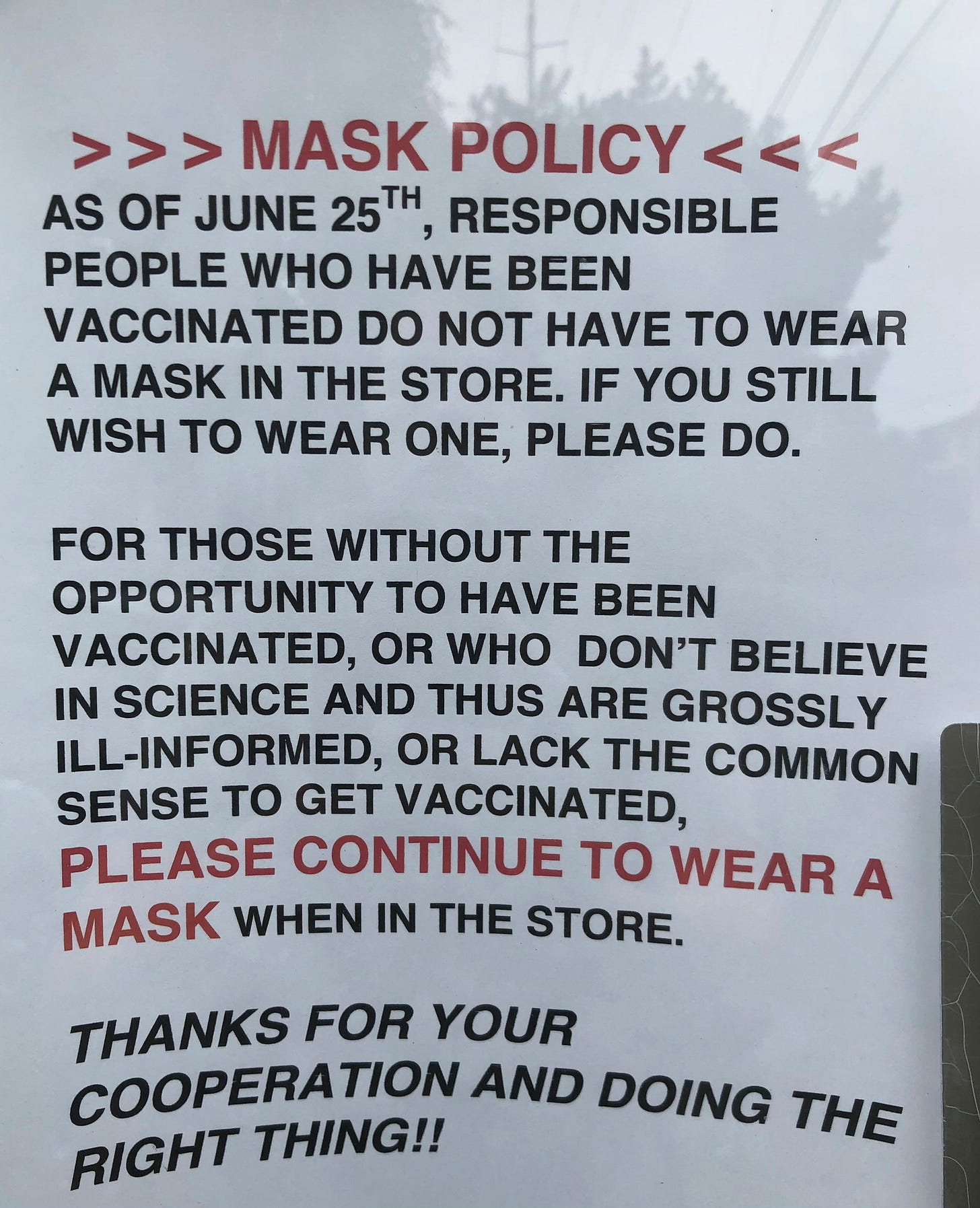


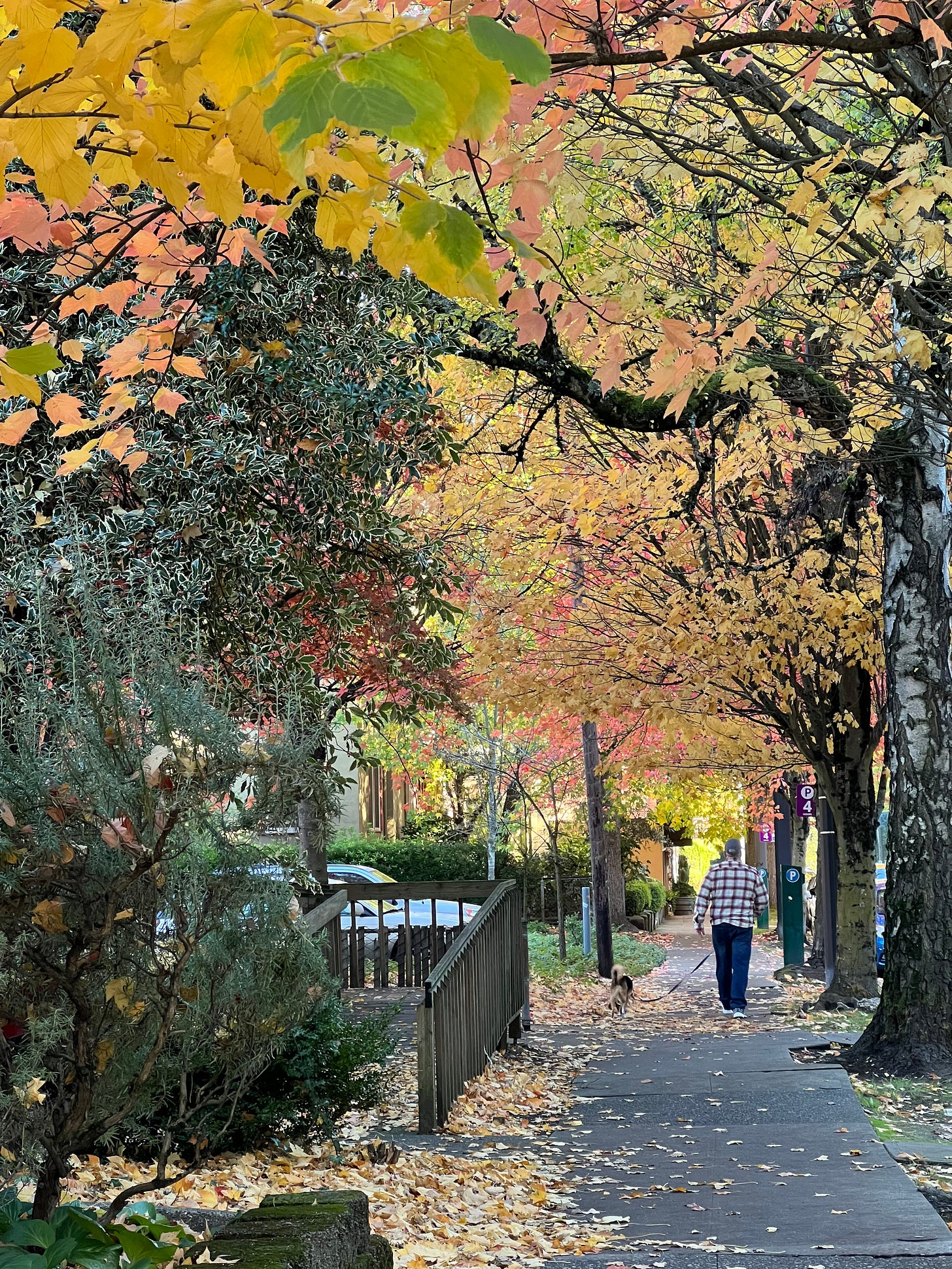





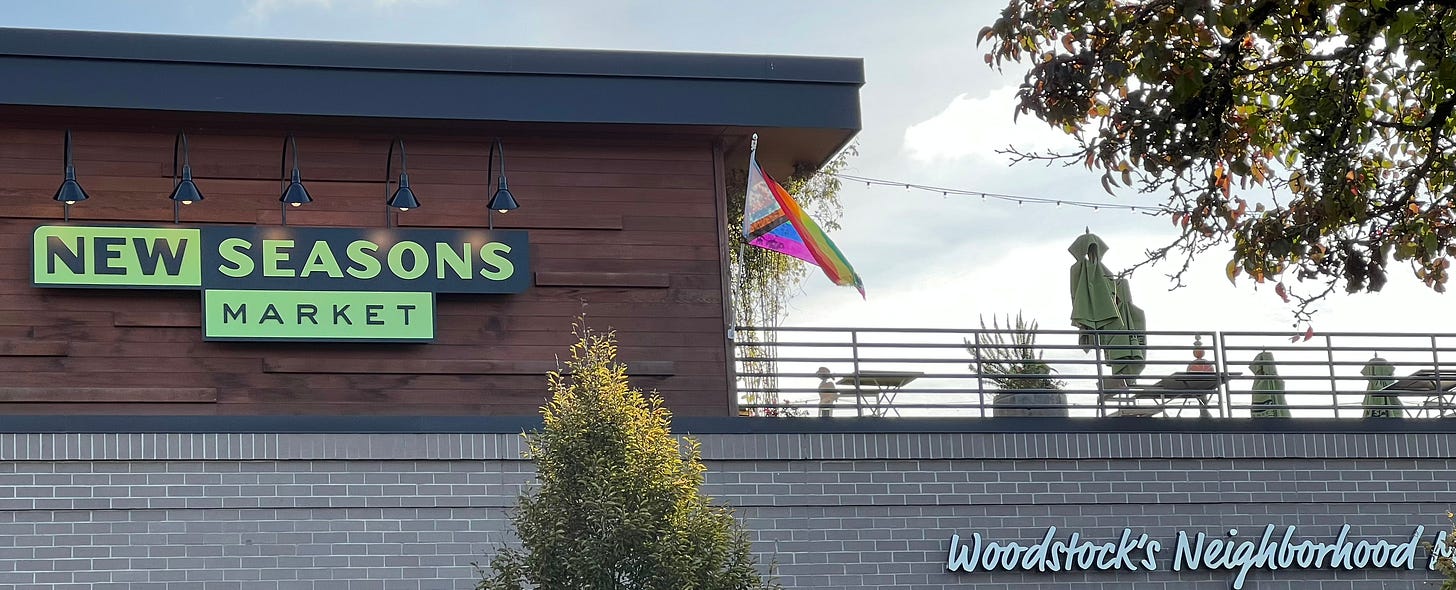

The last section "On Certainty", resonates with me AND sums up my experience over the past almost 3(!!) years...."Certainty has become a point of pride for people, and a way to shame those who don’t have it." What a succinct way to say what I've felt for so long. You have a gift with words and your writing is appreciated!
Excellent article Heather. So sad that cities are destroyed like this. It’s great that you, Bret and the boys have been able to move to what sounds like a lovely place.